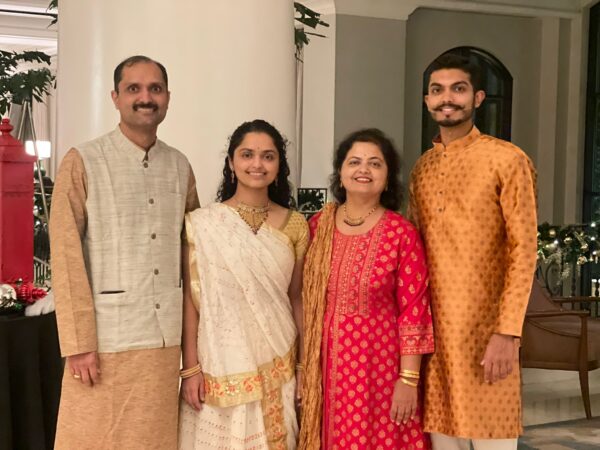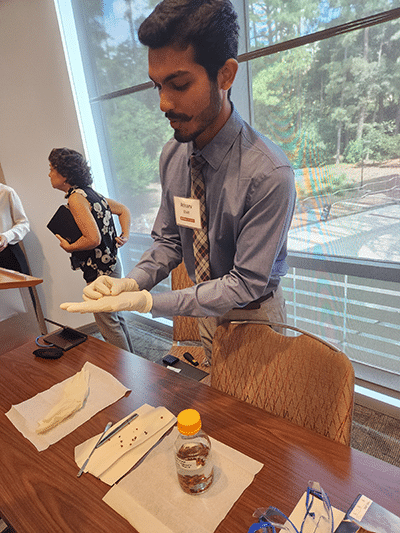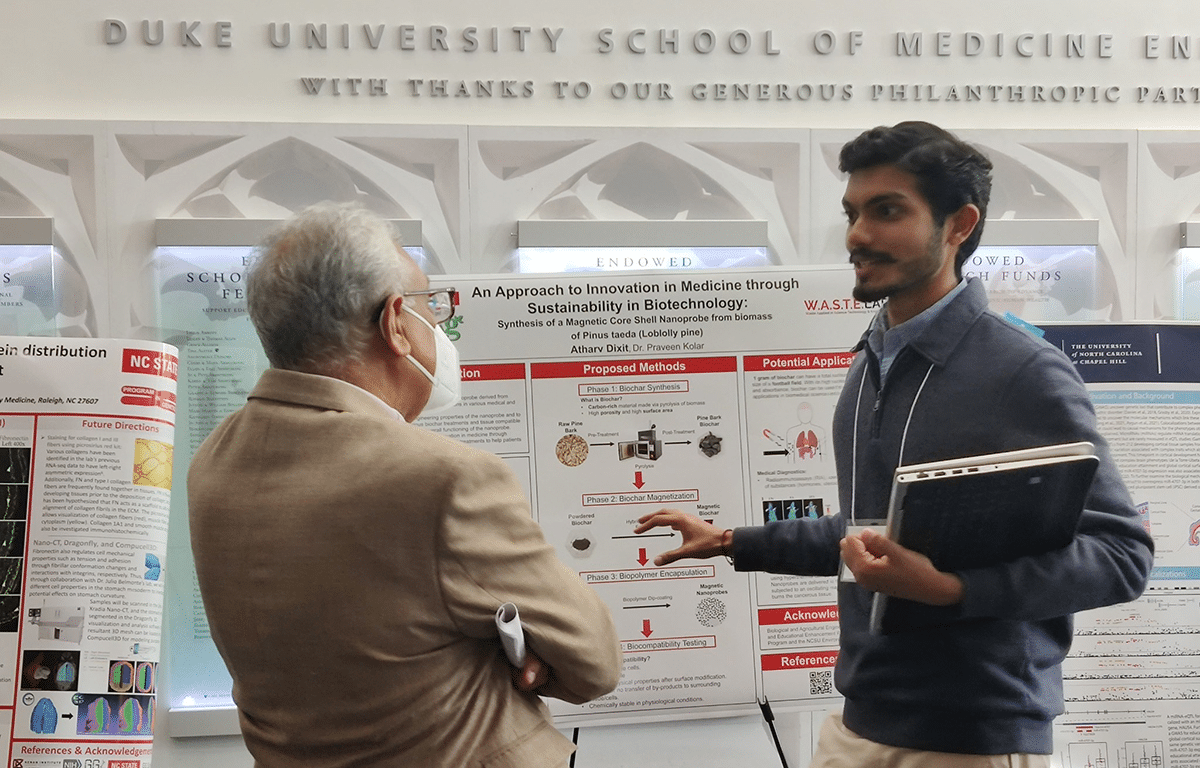“Look for the helpers,” Fred Rogers once said. Intended as advice to help children cope with fear, it has come to mean more for adults living in an era of unprecedented disrepair.
Biological and Agricultural Engineering senior Atharv Dixit is one of those people. His interests range from engineering to psychology, and he aims to find solutions to developing global challenges.
His character is as big as his ambition, and there are seemingly no limits to what he sets out to accomplish.
Developing Character
Atharv’s motivation is closely tied to experiences thanks in part to his parents.

The son of mechanical engineer Mehul Dixit and senior scientist Dr. Arati Dixit, he was fortunate to have spent his formative years in the United States and his adolescence near his family’s birthplace in India. Early on, his mother included him in engineering projects that also addressed social issues ranging from STEM education for women to technology access in remote locations.
“For my parents, education was important, but along with that, so was the importance of being a good human being and understanding there are other facets of life that I also need to develop.”
Exposure to multicultural communities shaped Atharv’s character. He drew inspiration from his mother’s journey as only one of two women in her small engineering school in Kopargaon, Maharashtra, India to her role as an executive council member with the Association for Computing Machinery’s Council on Women Global Leadership Team.
“Her journey inspired me to create my own opportunities, to become an engineer and to make an impact,” he says.
Interdisciplinary interests combined with an engineering skill set and a growth mindset ultimately led Atharv to pursue his secondary education at NC State University. The only four-year American institution he applied to with intentions of majoring in computer engineering.
“I was trying to convince [my family] about [the university], and I had already done a lot of research,” he says. He convinced his family enough that they drove four hours to the U.S. Embassy in Mumbai for a recruiting event to meet with an NC State admissions counselor.
He was admitted in the fall of 2018 and returned to the U.S. to begin a new chapter.
Seeking Opportunities
Atharv’s first two years were similar to those of his peers – finding his place, and his people, on campus.
With an interdisciplinary interest in engineering and medicine, he had difficulty declaring a major. “There are so many different engineering fields [at NC State] where interdisciplinary work is not just in the academic coursework, but also in the culture of research,” he says. “I saw an opportunity to combine my interests and apply what we were learning in the classroom to real-world scenarios. That’s what attracted me to biological engineering.”
BAE Agricultural Waste Management Professor Praveen Kolar was Atharv’s instructor for transport phenomena, which turned out to be a pivotal point in Atharv’s academic career.
“Dr. Kolar’s enthusiasm for his work on biochar was contagious,” he says. “I wanted to explore how my interest in medicine could be integrated with his work in sustainability.”
He also met BAE alumnae Victoria Augoustides who was conducting research in Kolar’s Environmental Analysis Lab, on the use of pine bark biochar in swine lagoon management. Her work showed Atharv that he could also conduct undergraduate research and empowered him to explore his own ideas.
“As an undergraduate student, you kind of undermine yourself,” he says. “It’s important to find different avenues to learn as a student and to be better as an engineer.”

On the Move
By 2022, Atharv had served as a BAE student ambassador, completed NC State’s Leadership Development Program, was a member of NC State’s ASABE student chapter, the NC State Rural Health Outreach Club, and the NC State Pre-PA/Nursing Club and served as President of the Divine Youth Association. Additionally, he had been working as a habilitation technician providing one-on-one support to individuals with disabilities.
One of his first research opportunities was with BAE Professor Sanjay Shah and College of Veterinary Medicine Assistant Professor Ravi Kulkarni on a diagnostics development project focusing on avian disease modeling that would be used to prevent infectious diseases in the poultry industry.
This year, he was selected as a BAE Research and Education Enhancement Project (REEP) Scholar. Under the advisement of Kolar, Atharv explored his research idea of creating magnetic nanoparticles out of pine bark biochar for targeted drug delivery systems.
“The idea is to load these nanoparticles with chemotherapeutics and inject them into the patient’s body. Using an external magnetic source, guide those nanoparticles directly to the spot doctors want to treat. That allows us to increase chemo dosage, reduce side effects and improve survival rates,” Atharv explains. “We’re able to create this sustainable treatment by using waste products, which increase farmers’ profits and decrease the cost of treatment further enabling patient access to affordable healthcare.”
He presented his project, titled An Approach to Innovation in Medicine through Sustainability in Biotechnology: Synthesis of a Magnetic Core Shell Nanoprobe from biomass of Pinus taeda (Loblolly Pine), at the Duke University Cell and Molecular Biology Symposium where he received first prize for the poster competition. He also received second prize in the American Association of Agricultural and Biological Engineers (ASABE) Tri-State Section Meeting 3-minute thesis competition, third prize in the Bayer 2-minute pitch research competition and third prize the North Carolina Agriculture and Life Sciences (NCALS) Research Foundation Board 2-minute pitch competition.
Simultaneously, he was working on an independent research project with BAE doctoral alumnus Nitesh Kasera who was developing biochar hydrogels for nitrogen absorption.
“In an effort to understand biochar magnetization, I proposed impregnating these hydrogels with iron to create magnetic hydrogels for wastewater decontamination,” he explains. “We created a biodegradable, non-toxic biofilter, made entirely from organic wastes obtained from farms that could absorb nutrients from agricultural wastewater. The spent media could then be sent back to the farms to be used as a slow-release fertilizer for their crops.”
Their project won first prize at the NC State 2023 Make-A-Thon.
“Spending long hours in the lab during the week of the Make-A-Thon, I knew that research is truly my passion, as its potential impact motivates me beyond belief.”
And this spring, he competed with an interdisciplinary team, including BAE MS graduate Nur-Al-Sarah Rafsan, in the Deloitte NC State StartUp Event where their biochar-to-battery startup named Char-ger won the Best Idea category.
What’s next? Atharv has an interest in pursuing a doctoral degree or perhaps an advanced medical degree. Where he lands next, he’ll always choose to follow Kolar’s mantra to Dream Big.
Written by: Laura Riddle for North Carolina State University; used with permission. Find the original article here.
Founded in 1978, the Council on Undergraduate Research (CUR) focuses on providing high-quality and collaborative undergraduate research, scholarly, and creative activity. Among the many activities and networking opportunities that CUR provides, the organization also offers support for the professional growth of faculty and administrators through expert-designed institutes, conferences, and a wide-range of volunteer positions. The CUR community, made up of nearly 700 institutions and 13,000 individuals, continues to provide a platform for discussion and other resources related to mentoring, connecting, and creating relationships centered around undergraduate research. CUR’s advocacy efforts are also a large portion of its work as they strive to strengthen support for undergraduate research. Its continued growth in connections with representatives, private foundations, government agencies, and campuses world-wide provides value to its members and gives voice to undergraduate research. CUR is committed to inclusivity and diversity in all of its activities and our community.
CUR focuses on giving a voice to undergraduate research with learning through doing. It provides connections to a multitude of campuses and government agencies, all while promoting networking and professional growth to its community.


